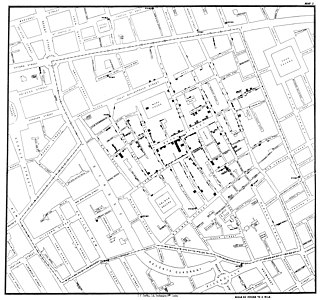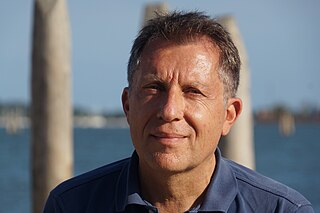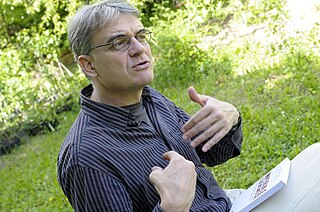Related Research Articles

Human geography or anthropogeography is the branch of geography which studies spatial relationships between human communities, cultures, economies, and their interactions with the environment, examples of which include urban sprawl and urban redevelopment. It analyzes spatial interdependencies between social interactions and the environment through qualitative and quantitative methods.This multidisciplinary approach draws from sociology, anthropology, economics, and environmental science, contributing to a comprehensive understanding of the intricate connections that shape lived spaces.
Social geography is the branch of human geography that is interested in the relationships between society and space, and is most closely related to social theory in general and sociology in particular, dealing with the relation of social phenomena and its spatial components. Though the term itself has a tradition of more than 100 years, there is no consensus on its explicit content. In 1968, Anne Buttimer noted that "[w]ith some notable exceptions, (...) social geography can be considered a field created and cultivated by a number of individual scholars rather than an academic tradition built up within particular schools". Since then, despite some calls for convergence centred on the structure and agency debate, its methodological, theoretical and topical diversity has spread even more, leading to numerous definitions of social geography and, therefore, contemporary scholars of the discipline identifying a great variety of different social geographies. However, as Benno Werlen remarked, these different perceptions are nothing else than different answers to the same two questions, which refer to the spatial constitution of society on the one hand, and to the spatial expression of social processes on the other.

Economic geography is the subfield of human geography that studies economic activity and factors affecting it. It can also be considered a subfield or method in economics. There are four branches of economic geography.
Feminist geography is a sub-discipline of human geography that applies the theories, methods, and critiques of feminism to the study of the human environment, society, and geographical space. Feminist geography emerged in the 1970s, when members of the women's movement called on academia to include women as both producers and subjects of academic work. Feminist geographers aim to incorporate positions of race, class, ability, and sexuality into the study of geography. The discipline was a target for the hoaxes of the grievance studies affair.

Torsten Hägerstrand was a Swedish geographer. He is known for his work on migration, cultural diffusion and time geography.

Edward William Soja was an urbanist, a postmodern political geographer and urban theorist. He worked on socio-spatial dialectic and spatial justice.

Max Bense was a German philosopher, writer, and publicist, known for his work in philosophy of science, logic, aesthetics, and semiotics. His thoughts combine natural sciences, art, and philosophy under a collective perspective and follow a definition of reality, which – under the term existential rationalism – is able to remove the separation between humanities and natural sciences.

Geography is the study of the lands, features, inhabitants, and phenomena of Earth. Geography is an all-encompassing discipline that seeks an understanding of Earth and its human and natural complexities—not merely where objects are, but also how they have changed and come to be. While geography is specific to Earth, many concepts can be applied more broadly to other celestial bodies in the field of planetary science. Geography has been called "a bridge between natural science and social science disciplines."

The sociology of space is a sub-discipline of sociology that mostly borrows from theories developed within the discipline of geography, including the sub fields of human geography, economic geography, and feminist geography. The "sociology" of space examines the social and material constitution of spaces. It is concerned with understanding the social practices, institutional forces, and material complexity of how humans and spaces interact. The sociology of space is an inter-disciplinary area of study, drawing on various theoretical traditions including Marxism, postcolonialism, and Science and Technology Studies, and overlaps and encompasses theorists with various academic disciplines such as geography and architecture. Edward T. Hall developed the study of Proxemics which concentrates on the empirical analysis of space in psychology.

Martina Löw is a German sociologist.

The following outline is provided as an overview of and topical guide to geography:
Hans-Georg Bohle was a German geographer and international development researcher.
In cultural and social studies, configurations are patterns of behaviour, movement and thinking, which research observes when analysing different cultures and/ or historical changes. The term “configurations” is mostly used by comparative anthropological studies and by cultural history. Configurational analysis became a special method by the Stuttgart school of Historical Behaviour Studies during the 1970s and later by body culture studies in Denmark.
Holger Ziegler is a professor of social work at the Faculty of Education at Bielefeld University. He was a member of the Research Training Group Youth Welfare and Social Services in Transition of the German Research Foundation (2000–2003), Fellow at the Department of Criminology at Keele University (UK) (2003) and Assistant Professor of Special Education at Westfälische Wilhelms University Münster. He has been a member of the academic advisory board of the German Soccer League since 2010; of the North Rhine-Westphalia research school Education and Capability and member of the Human Development and Capability Association (HDCA) and since 2010 speaker of the HDCA Thematic Group on Education.
The following outline is provided as an overview of and topical guide to social science:
Spatial music is composed music that intentionally exploits sound localization. Though present in Western music from biblical times in the form of the antiphon, as a component specific to new musical techniques the concept of spatial music was introduced as early as 1928 in Germany.
Spatial citizenship describes the ability of individuals and groups to interact and participate in societal spatial decision making through the reflexive production and use of geo-media. Spatial citizens are lay users who are able to use geo-media to question existing perspectives on action in space and to produce, communicate, and negotiate alternative spatial visions.

Jacques Lévy is a professor of geography and urbanism at the School of Architecture, Civil and Environmental Engineering of the École Polytechnique Fédérale de Lausanne (EPFL). He is the director of Chôros Laboratory and of the Doctoral Program in Architecture and Science of the City. He is the cofounder of the scientific journal EspacesTemps.net. He published in French, along with Michel Lussault, the dictionary of geography and space of societies, Dictionnaire de la géographie et de l’espace des sociétés.He has contributed to in the epistemological and theoretical reform of geography as a science of the spatial dimension of the social, open to the social sciences and philosophy. Starting from political geography, he has most notably explored the city, urbanity, Europe and globalization. He works also for the introduction of non-verbal languages, especially audio-visual languages, at all levels of research. In 2013 he made a feature film, Urbanity/ies, which is intended as a manifesto for scientific film.

Ulrich Brand is a German political scientist. Since September 2007 he has been a professor of International Politics at the University of Vienna.
Heiko Haumann is a German historian and retired academic scholar.
References
- ↑ "Commissions – IGU Online".
- ↑ Lippuner, Roland (2011). "Benno Werlen". In Hubbard, Phil; Kitchin, Rob (eds.). Key Thinkers on Space and Place. London: Sage. p. 462.
- 1 2 Werlen, Benno (1997). Sozialgeographie alltäglicher Regionalisierungen Vol. 2: Globalisierung, Region und Regionalisierung. Stuttgart: Franz Steiner Verlag.
- 1 2 3 Meusburger, Peter, ed. (1999). Handlungszentrierte Sozialgeographie: Benno Werlens Entwurf in kritischer Diskussion. Stuttgart: Franz Steiner Verlag.
- ↑ Dürr, Heiner (2001). "Handreichungen für diskursive Geographien: Zu Benno Werlens Einblicken in die Sozialgeographie". Geographische Revue. 3 (2): 55.
- ↑ Werlen, Benno (1987). Gesellschaft, Handlung und Raum: Grundlagen handlungstheoretischer Sozialgeographie. Stuttgart: Franz Steiner Verlag.
- ↑ Werlen, Benno (1993). Society, Action and Space: An Alternative Human Geography. London: Routledge.
- ↑ Werlen, Benno (1993). Society, Action and Space: An Alternative Human Geography. London: Routledge. p. 3.
- 1 2 Werlen, Benno (2004). "The Making of Globalized Everyday Geographies". In Bærenholdt, Jørgen Ole; Simonsen, Kirsten (eds.). Space Odysseys: Spatiality and Social Relations in the 21st Century. Aldershot: Ashgate. pp. 159–164.
- ↑ Werlen, Benno (1995). Sozialgeographie alltäglicher Regionalisierungen Vol. 1: Zur Ontologie von Gesellschaft und Raum. Stuttgart: Franz Steiner Verlag.
- ↑ Werlen, Benno, ed. (2008). Sozialgeographie alltäglicher Regionalisierungen Vol. 3: Empirische Befunde. Stuttgart: Franz Steiner Verlag.
- ↑ Werlen, Benno (1997). Sozialgeographie alltäglicher Regionalisierungen. Stuttgart: Franz Steiner Verlag. pp. 141–213.
- ↑ Werlen, Benno (1997). Sozialgeographie alltäglicer Regionalisierungen Vol. 2: Globalisierung, Region und Regionalisierung. Stuttgart: Franz Steiner Verlag. p. 64.
- ↑ Werlen, Benno (1997). Sozialgeographie alltäglicher Regionalisierungen Vol. 2: Globalisierung, Region und Regionalisierung. Stuttgart: Franz Steiner Verlag. pp. 285–421.
- ↑ Erwägen. Wissen. Ethik: Forum für Erwägungskultur. Vol. 24. 2013.
- ↑ Thielmann, Tristan; Döring, Jörg, eds. (2008). Spatial Turn: Das Raumparadigma in den Kultur- und Sozialwissenschaften. Bielefeld: Transcript.
- ↑ Schroer, Markus (2013). "Vom "Raum" zur "Praxis": Probleme bei der Untersuchung "gesellschaftlicher Raumverhältnisse"". Erwägen. Wissen. Ethik: Forum für Erwägungskultur. 24 (1): 65–67.
- ↑ Löw, Martina (2013). "Welcher Raum?". Erwägen. Wissen. Ethik: Forum für Erwägungskultur. 24 (1): 49–51.
- ↑ Werlen, Benno (2010). "Epilog: Neue geographische Verhältnisse und die Zukunft der Gesellschaftlichkeit". Gesellschaftliche Räumlichkeit Vol. 2: Konstruktion geographischer Wirklichkeiten. Stuttgart: Franz Steiner Verlag. pp. 321–338.
- ↑ Werlen, Benno, ed. (2015). Global Sustainability: Cultural Perspectives and Challenges for Transdisciplinary Integrated Research. Dordrecht: Springer.
- ↑ Werlen, Benno (2015). "From Local to Global Sustainability: Transdisciplinary Integrated Research in the Digital Age". In Werlen, Benno (ed.). Global Sustainability: Cultural Perspectives and Challenges for Transdisciplinary Integrated Research. Dordrecht: Springer. pp. 3–16.
- ↑ "The International Year of Global Understanding" . Retrieved 13 May 2019.